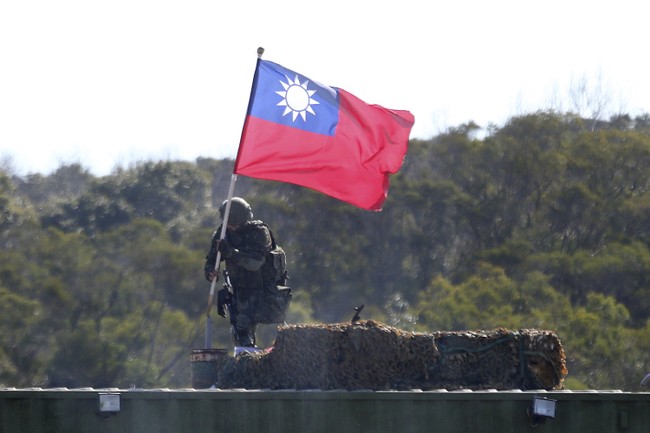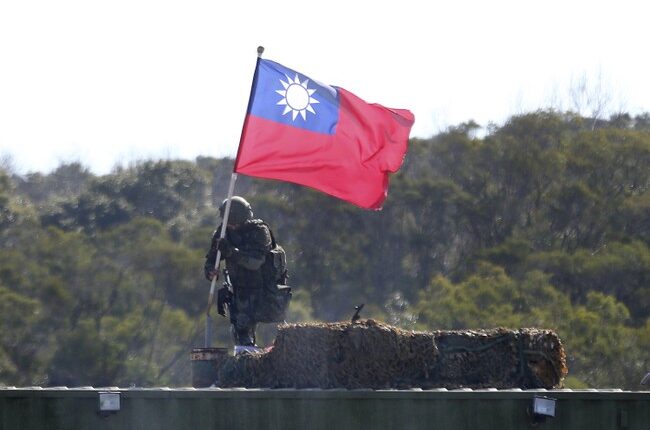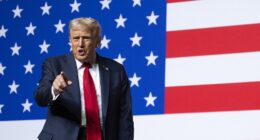
There has once again, and unsurprisingly, been a fair amount of focus on Taiwan, from Beijing’s military activity around the island and reports that Xi will push President Trump to officially oppose Taiwan independence, to Xi’s National Day address that called for national resistance to Taiwan independence.
Mainstream media reports based on anonymous sources are helping fuel the narrative that President Trump would be willing to abandon Taiwan over a trade deal with China. These include a Financial Times story about the Trump administration supposedly blocking Taiwanese President Lai Ching-te’s transit through the U.S.—an assertion that both Washington and Taipei denied—and a Washington Post article alleging that President Trump, the same individual who urged Congress to boost Taiwan defense aid, is withholding $400 million in military aid to Taiwan—a claim that Taipei and Washington have declined to comment on.
But in reality, there is nothing to support this narrative. The Trump administration remains committed to maintaining peace in the Taiwan Strait. The U.S.’s Taiwan policy remains unchanged, according to U.S. Ambassador to China David Perdue and a State Department spokesperson.
Washington continues to adhere to the One China Policy, the Three Communiques, the Taiwan Relations Act, and the Six Assurances—with these documents forming the foundation for official relations with the People’s Republic of China and informal ties with Taipei. Washington has not abandoned its policy of strategic ambiguity when it comes to the defense of Taiwan. Whether or not strategic ambiguity serves a purpose today is a separate debate.
Keep in mind that it was Trump who broke with decades of precedent by accepting a congratulatory phone call from Taiwanese President Tsai Ing-wen following his 2016 victory.
President Trump ramped up arms sales to Taiwan during his first term, reaffirming his commitment to the island’s security. Weapons sales to the island during his first term alone exceeded the sales in Obama’s two terms combined.
President Trump also allegedly warned Xi during his first term that he would bomb Beijing if the Chinese military invaded Taiwan.
And there is nothing to suggest that President Trump’s position toward Taiwan has changed this time around as Beijing doubles down on its claim over the island. Just look at the facts.
The Trump administration recognized early on the risks associated with the backlog in American weapons shipments to the island and has been working to address this.
In terms of multilateralism, Secretary of State Marco Rubio and his Japanese and South Korean counterparts emphasized the importance of ensuring peace in the Taiwan Strait and supporting Taiwan’s inclusion in relevant international bodies.
The State Department removed wording from its website relating to not supporting Taiwan independence.
Additionally, a month after the debunked Financial Times report, American and Taiwanese defense officials held a meeting in Alaska.
At the Shangri-La Dialogue in Singapore in May, Secretary of War Pete Hegseth acknowledged the threat China poses to Taiwan and the need to be prepared:
Every day you see it. China’s military harasses Taiwan. These activities have been paired with China’s rapid military modernization and buildup—including huge investments in nuclear weapons, hypersonics, and amphibious assault capabilities.
It has to be clear to all that Beijing is credibly preparing to potentially use military force to alter the balance of power in the Indo-Pacific. We know. It’s public that Xi has ordered his military to be capable of invading Taiwan by 2027. The PLA is building the military needed to do it. Training for it every day. And rehearsing for the real deal. Admiral Paparo has spoken very clearly about this on multiple occasions.
Again, to be clear: any attempt by Communist China to conquer Taiwan by force would result in devastating consequences for the Indo-Pacific and the world. There’s no reason to sugarcoat it. The threat China poses is real.
And it could be imminent. We hope not. But it certainly could be.
In July, the Pentagon reportedly requested Australia and Japan to clarify the role they would play if war over Taiwan broke out.
Examples abound of the Trump administration’s recognition of the geopolitical significance of Taiwan and its centrality to deterring China.
SEE ALSO: Taiwan’s Failed Mass Recall Vote: What Is Next?
Chinese Military Holds Exercises Around Taiwan to Send ‘Severe Warning’
There is a clear difference between abandoning Taiwan, as mainstream media outlets are claiming the Trump administration is doing, and pushing the island’s leadership to increase its military spending and preparedness. One is in the island’s—and our—interests while the other is not.
The same logic is behind the administration’s efforts to persuade the Taiwanese government to move the production of its most advanced chips to the U.S. Taiwan produces 90 percent of the world’s most advanced semiconductors and about 60 percent of all semiconductors. Imagine how disruptive a military invasion—even a blockade—would be to the global semiconductor supply chain. The idea that Taiwan’s dominance in semiconductor production somehow deters China from invading—known as the “silicon shield”—is outdated and ignores Beijing’s aggressive push for semiconductor self-sufficiency.
If China is pursuing semiconductor independence, why should the U.S. not do the same? Would it not be wise for the U.S. to work to secure a vulnerable supply chain?
Though it is reported that the Taiwanese officials have rejected the administration’s proposal of a 50-50 division in chip production, it is yet to be seen what Taipei agrees to in terms of semiconductor offshoring, especially in light of President Trump’s $100 billion deal with Taiwan Semiconductor Manufacturing Company to build five factories in the U.S. The Trump administration may be intentionally highballing in order to settle on a lower, yet acceptable, percentage—or perhaps the administration will use other tools to persuade Taiwan to move closer to 50 percent.
Beyond the 50-50 division proposal—which was not directly discussed between officials, according to Taiwanese Vice Premier Cheng Li-chiun—U.S.-Taiwan trade talks continue to move forward. The Taiwanese side expressed “certain progress” in negotiating a favorable trade deal for both countries.
Despite some people’s wishful thinking, President Trump has not turned on Taiwan, nor does the administration harbor any ill will toward the independent island—actually, quite the opposite. U.S.-Taiwan cooperation has only become stronger, with sales packages of advanced systems set to increase substantially (see additional purchases Taipei plans to make per Washington’s recommendations, which indicates bilateral engagement). This administration is committed to deterring China in the Asia-Pacific and recognizes the importance of a free Taiwan.
Taipei appears confident in the current state of U.S.-Taiwan defense cooperation:
As a responsible member of the region, Taiwan is determined and confident in continuing to strengthen its self-defense capabilities and to work with partner countries like the U.S. to deter aggression and safeguard regional peace, stability and prosperity.
But as everyone focuses on a full-scale military invasion of Taiwan, which is crucial, it must not be overlooked that China has been chipping away at Taiwan—its society and political system—using gray-zone tactics. This is a less costly alternative for Beijing. The assault on Taiwan is already well underway, and how Taipei responds will matter immensely.
Editor’s Note: The Schumer Shutdown is here. Rather than put the American people first, Chuck Schumer and the radical Democrats forced a government shutdown for healthcare for illegals. They own this.
Help us continue to report the truth about the Schumer Shutdown. Use promo code POTUS47 to get 74% off your VIP membership.








